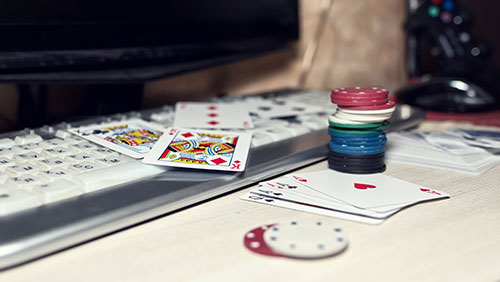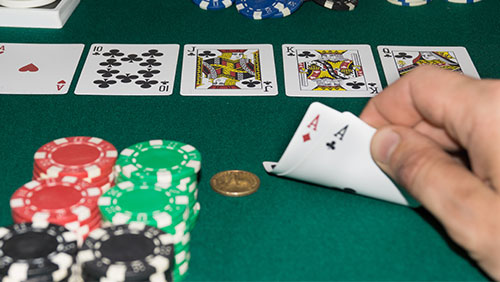Lee Davy mates a Bernadette Jiwa blog post with a Steven Pressfield word for procrastination and a Cognitive Behavioural Therapy tool to come up with an article on chopping the heads off poker players.
Your wife called you a cock while throwing a toy clown at your laptop. The screen smashes. You had pocket aces. Money bubble. She hates you. You hate her. Later as the people who steal cars come out to play you lie on your hedgehog of a mattress talking to your mate, and listen as he tells you how to get closer to the clown slinging, cock screaming woman of yours.
Only you don’t want to get close to her.
In the world of Cognitive Behavioural Therapy (CBT) there is a Gandalf type wizard called David D. Burns. If you told him this story, he would likely tell you that you suffered from Outcome Resistance, and until you took a blowtorch to that resistance, melting it – nothing changes.
The man in question plays poker all the time. He knows the clown slinger is pushing a Pennywise into the mortar. The distance kept deliberately vast. If he decided to close the gap, like in 1969, he would have to open up his heart and share how he feels.
Fuck that.
PLO it is then.
And I’ve been thinking about Outcome Resistance, and it’s non-identical twin brother Process Resistance (the refusal to do any work), a lot this week.
I’m not sure if you know (or if you even care) but after I’m done writing this, I’m going to log on to a forum of folk trying to be people who don’t drink alcohol. It’s my side gig. Something I began in 2009 when I shifted from the masses to the minors.
I have a training course that helps them.
Only 44% of people graduate.
Of the 44%, 77% achieve their goal.
Outcome and Process Resistance.
The metrics show I’m making the mistake of not melting the resistance before we begin ‘doing the work’, and this is leading to the high dropout rate. I need to pivot and pivot like a top Salsa dancer. I need a process that filters out those that are ready from those that aren’t.
And I’m afraid to pull the trigger because I want to help everyone.
How PokerStars et al. Fits Into This
You know I bang on about the Australian marketing and branding angel, Bernadette Jiwa.
Here I go again.
This morning, as I ate my pumpkin spiced oats, I read an article of hers called Why Do You Want to Tell a Good Brand Story? In which Jiwa shares her client’s most common answers when she asks them why storytelling is so vital for a brand.
Brand awareness – the more people who know about your product, the more products and services you sell.
Customer focus – a great story attracts more customers.
And there’s me.
You want people to see you in a good light.
And I’m not alone.
PokerStars also struggle with this one.
partypoker will face the same dilemma if they can stop servers from going belly-up.
The Three Lessons
There are three lessons that Jiwa has picked up from working with, observing and researching the greatest brand storytellers in the world.
1. Allocate resources where they have the most impact.
2. Get clear about the kind of customers you do and don’t want to attract.
3. Be as good at turning off the wrong customers as you are at attracting the right ones.
Can you see the problem?
 In my little world of sparkling water and herbal tea, the people who need my help (I hate to call them customers) fall into two categories. The ones who want my help, and the ones who think they want my help but don’t want really want my help.
In my little world of sparkling water and herbal tea, the people who need my help (I hate to call them customers) fall into two categories. The ones who want my help, and the ones who think they want my help but don’t want really want my help.
I need to have a brand story that makes it clear that I only want to attract the former. I am doing this by focusing on the stories of the people who don’t drink alcohol, and how much work they had to put in to get the rewards. I will make it so clear to people about the level of commitment that is demanded from the movement, that people who aren’t ready will show up as the dark pieces inside an avocado.
Online poker rooms have a similar problem. The game of online poker was never meant to be a profession. It’s a game. It’s a form of entertainment. As long as there are professionals in the game, it’s going to be tough for people like me to have much fun.
PokerStars made changes to show more loyalty to people like me. They introduced new game types, a smarter rewards system and opened up the opportunity for me to play casino games and bet on the 15:00 at Ripon. However, the story isn’t right. It doesn’t seem real. It’s more fiction than non-fiction.
If you listen to a PokerStars employee talk, they’ll tell you that they still care about the professional poker players. And that they always try to provide them with value. I believe them. But it confuses the story. Can a company have two very different brand stories?
Maybe.
But I think it dilutes the main theme.
When I close my eyes and think of partypoker, I see this neon sign in front of my eyes.
MILLIONS
I don’t see any talk of recreational or professional players. I just see MILLIONS. Money. Wealth. Success. A life-changing thing.
When RunItOnce Poker opens for business the brand story will be aligned to the professional. 888Poker‘s is to take back the game, clearly aligned to recreational players (although they won’t say that). When I think Unibet I see a story of love and togetherness.
I know it’s difficult to come out and say it.
“We don’t want you.”
“You’re not the type of customer we want.”
I’m feeling it right now.
But in every great story, someone at some time gets crushed.
It’s time to crush the crushers.





